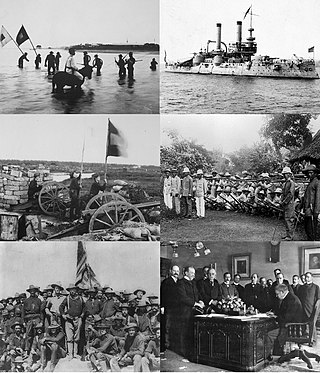
The Spanish–American War began in the aftermath of the internal explosion of USS Maine in Havana Harbor in Cuba, leading to United States intervention in the Cuban War of Independence. The war led to the United States emerging predominant in the Caribbean region, and resulted in U.S. acquisition of Puerto Rico, Guam, and the Philippines. It also led to United States involvement in the Philippine Revolution and later to the Philippine–American War.

On March 2, 1901, the Platt Amendment was passed as part of the 1901 Army Appropriations Bill. It stipulated seven conditions for the withdrawal of United States troops remaining in Cuba at the end of the Spanish–American War, and an eighth condition that Cuba sign a treaty accepting these seven conditions. It defined the terms of Cuban–U.S. relations essentially to be an unequal one of U.S. dominance over Cuba.

USS Bordelon (DD/DDR-881) was one of 98 World War II Gearing-class destroyers of the United States Navy, and was named for Marine Staff Sergeant William J. Bordelon (1920–1943), who was posthumously awarded the Medal of Honor for his heroism in the Battle of Tarawa.

The Cuba was a steamship owned by the Pacific Mail Steamship Company. Originally launched in 1897 as the German SS Coblenz, she was seized by the United States in 1917, and named SS Sachem, until Pacific Mail purchased her from the Shipping Board on February 6, 1920, for US$400,000 and renamed SS Cuba.
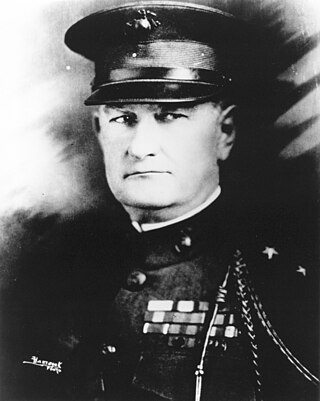
Wendell Cushing Neville was a major general of the Marine Corps as well as a Medal of Honor recipient and the 14th Commandant of the Marine Corps between 1929 and 1930.

The Battle of Guantánamo Bay was fought from June 6 to June 14 in 1898, during the Spanish–American War, when American and Cuban forces seized the strategically and commercially important harbor of Guantánamo Bay, Cuba. Capturing the bay from the Spanish forces was instrumental in the following Battle of Santiago de Cuba and the subsequent invasion of Puerto Rico. Although overshadowed by the land and sea battles at Santiago, the establishment of the United States naval base at Guantánamo Bay and the rout of defending Spanish troops by American and Cuban forces was important in the final Spanish defeat.

Noteworthy events of Guantánamo Bay.

The 1st Marine Regiment is an infantry regiment of the United States Marine Corps based at Marine Corps Base Camp Pendleton, California. The regiment is under the command of the 1st Marine Division and the I Marine Expeditionary Force. The 1st Marine Regiment is also sometimes referred to as "Regimental Combat Team 1" or "Inchon".

The 7th Marine Regiment is an infantry regiment of the United States Marine Corps based at Marine Corps Air Ground Combat Center Twentynine Palms, California. Nicknamed the "Magnificent Seventh", the regiment falls under the command of the 1st Marine Division and the I Marine Expeditionary Force.
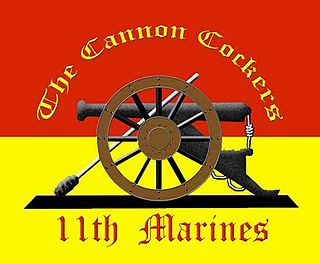
The 11th Marine Regiment is an artillery regiment of the United States Marine Corps based at Marine Corps Base Camp Pendleton, California. Known as the "Cannon Cockers", the regiment falls under the command of the 1st Marine Division and the I Marine Expeditionary Force. Its primary weapon system is the M777A2 howitzer with a maximum effective range of 30 km, however the 5th Battalion has converted to fire the HIMARS weapon system.
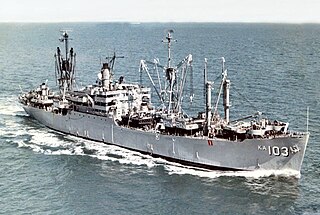
USS Rankin (AKA-103/LKA-103) was a Tolland-class attack cargo ship in service with the United States Navy from 1945 to 1947 and again from 1952 to 1971. She was finally sunk as an artificial reef in 1988.
Operation Ortsac was the code name for a possible invasion of Cuba planned by the United States military in 1962. The name was derived from then Cuban President Fidel Castro by spelling his surname backwards.
Diabolito or Little Devil was a 19th-century Cuban pirate. One of the more violent of the era, he engaged the United States Navy and Revenue Marine Service several times, being one of the main fugitives hunted and pursued later by American Naval forces during the West Indies anti-piracy operations of the United States in the Caribbean during the 1820s. He was also known for having a mixed-race crew, which included “English, Frenchmen, Spaniards, Mulattoes, and Negroes.”

Wanamassa (YTB-820) is a United States Navy Natick-class large harbor tug named for Wanamassa, New Jersey.
Eugnathides is an extinct genus of prehistoric bony fish that lived from the Oxfordian to the early Tithonian stage of the Late Jurassic epoch. Eugnathides may have been similar to Sphaerodontes.
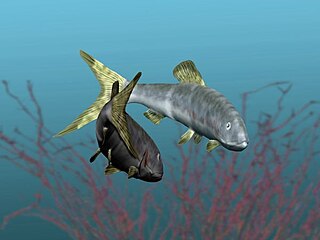
Luisichthys is an extinct genus of ray-finned fish that lived in what is now Cuba from the Oxfordian to the early Tithonian stage of the Late Jurassic epoch. It contains one species, Luisichthys vinalesensis.

Auzella Savage was a sailor in the U.S. Navy stationed aboard the USS Santiago de Cuba during the American Civil War. He received the Medal of Honor for his actions during the Second Battle of Fort Fisher on January 15, 1865.
The War of 1912, also known as the Little Race War, the Negro Rebellion, or The Twelve, was a series of protests and uprisings in 1912 in Cuba, which saw conflict between Afro-Cuban rebels and the armed forces of Cuba. It took place mainly in the eastern region of the island, where most Afro-Cubans were employed. After weeks of fighting, which involved massacres of Afro-Cubans by the Cuban National Army led by General Jesus Monteagudo and a U.S. military intervention to protect American companies, the rebellion was put down. The leaders of the Afro-Cuban rebels, Evaristo Estenoz and Pedro Ivonnet, were killed during the rebellion and their political movement, The Independent Party of Color, was dissolved. Between 3,000 and 6,000 people were killed in the rebellion.

The Cuban Love Song is a 1931 American pre-Code musical film directed by W.S. Van Dyke and written by C. Gardner Sullivan, Bess Meredyth, John Lynch, John Colton, Gilbert Emery, Robert E. Hopkins and Paul Hervey Fox. The film stars Lawrence Tibbett, Lupe Vélez, Ernest Torrence, Jimmy Durante, Karen Morley and Louise Fazenda. The film was released on December 5, 1931 by Metro-Goldwyn-Mayer.















